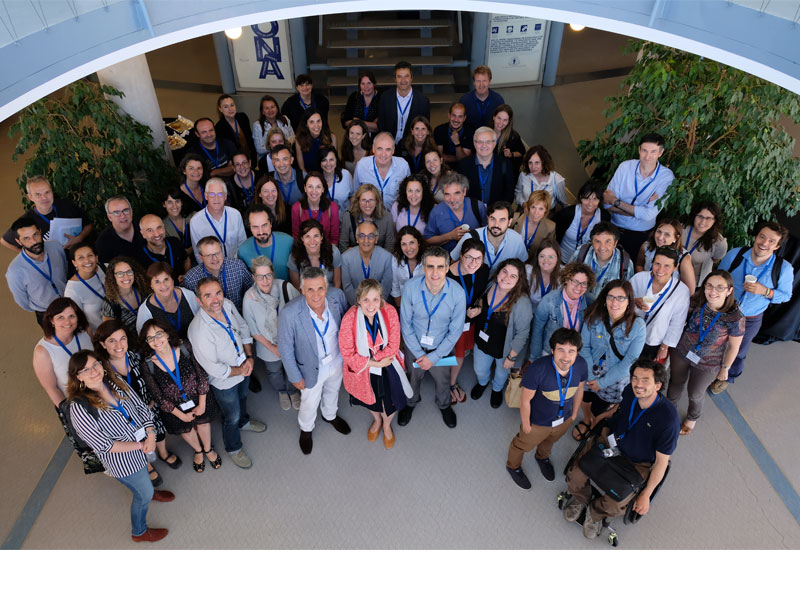In a brand new format, scientists come together to share and discuss research on the Can Ruti Campus in the First IGTP PI Retreat

The First IGTP PI Retreat took place on Tuesday 18 June at the Badalona Conference Centre (BCIN). The event was open to all principal investigators (PI) on the campus with a formal affiliation to the IGTP, which included researchers from the IGTP, CEEISCAT, ICO, IJC, IrsiCaixa, ISGlobal* and many researchers from the Germans Trias Hospital. The organizers were particularly happy to welcome groups from the Maresme Health Consortium and the Jordi Gol IDIAP Foundation, who are also affiliated to the IGTP and carry out valuable research in primary care.
One of the main objectives of the meeting was to explore all the many varied areas of research that is taking place on the campus with a view to promoting and facilitating collaborations and synergies between research groups, but also between institutions.
"We wanted the event to be inclusive," explained Dr Julia Garcia Prado, Scientific Director of the IGTP and PI from IrsiCaixa. "A global snapshot of the many lines of research on the campus is an important starting point for discussion of our future strategies and generation of new transversal programs, and I certainly feel that we have achieved this today."
The day opened with a thought-provoking talk on "Data Driven Medicine" by Dr Natasa Przulj, ICREA Research Professor at the Barcelona Supercomputing Centre. Next, the most important part of the first scientific retreat focussed on the leaders of research on the campus. In two sessions, chaired by Dr Anna Martínez Cardús and Dr Hernando A del Portillo (also co-organizers) 19 principal researchers made ten-minute presentations organized according to the 9 established research areas, in which they highlighted the strengths and strategic lines in their area. These sessions underlined the number of diseases being studied and the breadth of research lines on the campus, but also the enormous wealth of expertise that exists.
Discussing technology and the role of scientists today
Technology and discussions on the role of scientists and their relationship with society were also in the menu. In a session chaired by Jaume Ruiz, Head of Innovation and Business Development at the IGTP, four talks demonstrated the powerful technologies that have become available to researchers on the campus in recent years. Sara Capdevila, Technical Director of the Comparative Medicine and Bioimage Centre (CMCiB) outlined the facilities and services now on offer at the CMCiB and Dr Rafael Coronado explained the imaging research and development opportunities that the partnership with Canon is making available. Dr Rafael de Cid brought those present up to date with the data now available and that to come on the GCAT Genomes for Life cohort for prospective studies. The session was closed by Dr Clara Prats of the Polytechnic University of Catalonia (UPC) who explained how a partnership between her team at the UPC and the CMCiB was refining preclinical research by using computational modelling in translational medicine.
The round off the day, Julia Garcia Prado chaired a round table session with Dr Cesar Velasco, Director of AQuAS, Dr Teresa Tarrago, CEO of IProteos, Dr Manel Esteller, Director of the IJC and also a recently arrived PI on the campus, Dr Mariona Serra (CEO of Goodgut) and Dr Manel Puig, Director of the IGTP. The team touched on three questions with lively participation from the audience. When considering the role of the scientists today, there was general agreement that we are in a phase of redefinition and a need to to reinforce the liaison between basic research and innovation having translational impact in public health. Discussion moved from the needs of society to who should fund and lead innovation initiatives while preserving fundamental science, through to aspects of funding policy and evaluation methods. The question of the role of AI was equally complex and included aspects of data collection tools available to scientists in the public sector and the cost and policies of data management. Manel Puig described two systems currently in use for AI-assisted diagnosis from images in endocrinology; devised and validated by medical teams. Julia Garcia Prado wrapped up the session with a reflection on the many different concepts a scientist must now take into account when defining their relationship with society. The afternoon was closed with a presentation from the Epic Foundation of the well-known theatrical group "La Fura del Baus", also closely linked with the town of Badalona.
*The centres participating from the campus were:
| CEEISCAT | Centre for Epidemiological Studies of Sexually Transmitted Disease and AIDS in Catalonia |
| ICO | Catalan Institute of Oncology (Badalona Section) |
| IGTP | Germans Trias i Pujol Research Institute |
| HGT | Germans Trias University Hospital |
| IJC | Josep Carreras Leukaemia Research Institute |
| IrsiCaixa | IrsiCaixa AIDS Reserch Institute |
| ISGlobal | Barcelona Institute for Global Health |
| CSdM | Maresme Health Consortium |
| IDIAP Jordi Gol | The University Institute for Primary Health Care Research Jordi Gol i Gurina) |

